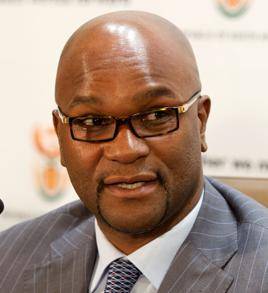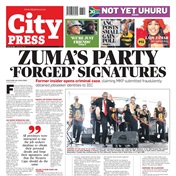
Whistle-blowers claim that Mzansi Golden Economy fund’s millions are allocated to artists without checks and balances
Ladysmith Black Mambazo was allocated R36 million over three years by the department of arts and culture to teach traditional Zulu song and dance – and to make an album with former president Jacob Zuma.
This is among the questionable funding deals, amounting to more than R100 million, to have rocked the department, led by Minister Nathi Mthethwa, for the 2018/2019 funding period alone.
Further funding allocations which senior sources in the department claimed were questionable include:
. R50 million paid to the National Empowerment Fund (NEF) without the required committee approvals;
. R20 million over two years assigned to the Indoni SA cultural organisation, which had already held its Miss Cultural SA Festival by the time it was paid. Indoni responded by saying it could not “comment on the department of arts and culture funding policy and criteria”;
. R12 million for the Usiba cultural awards show, hosted by Mthethwa himself, which went to an arts federation under investigation by the Special Investigating Unit (SIU); and
. R10 million to the Living Legends trust fund, and another R3 million from the department to private lawyers.
The department’s own rules – contained in a document titled Mzansi Golden Economy Guidelines: Criteria, Eligibility, Processes & Systems, which City Press obtained – stipulate that there is a R1 million threshold for funding individuals and R2 million for events and tours.
Any amounts exceeding that must be approved by a committee.
However, this did not happen in the cases of the contested beneficiaries, numerous sources alleged.
In addition, the department of arts and culture, now merged with the sports ministry, is wracked by suspicions and suspensions.
One deputy director-general resigned after she was apparently suspended for singing a song linked to President Cyril Ramaphosa’s “new dawn”.
Several senior department sources told City Press that Mthethwa and two senior department officials – director-general Vusumuzi Mkhize and chief director Charles Mabaso – were privy to decisions to fund the projects.
This was done, sources claim, without following the department’s own policies.
The files on the questionable projects are also allegedly not at the ministry’s Pretoria headquarters, where they should be, along with those on other projects funded by the arts ministry.
Department spokesperson Zimasa Velaphi on Saturday denied that there was anything irregular about the funding.
THE MISSING FILES
Sources told City Press that at least eight projects currently funded by the state appear to be procedurally irregular.
While many other projects appear to be above-board, six out of eight contested beneficiaries are noted on a document called “List of unsolicited or walk-in proposals received by cultural development unit to be assessed for funding in 2018/19”.
They are all paid for from the department’s R340 million annual arts funding scheme, called the Mzansi Golden Economy.
The beneficiaries of the projects include: Ladysmith Black Mambazo’s Amabaso Musical Productions, Living Legends Legacy Trust, Mzansi Broadcasting Academy, kwaito star Eugene Mthethwa, the World Gospel Powerhouse organisation, Indoni SA, and the Cultural and Creative Industries Federation of SA (Ccifsa).
Sources say that even the department’s deputy director-generals were not included in funding decisions, except for the acting director-general in charge of arts and culture promotion and development, Mabaso, who is also chief director.
City Press has seen internal approvals that appear to show that as chief director, Mabaso requested the funding, and as acting director-general, he then approved them.
Velaphi said there was nothing untoward about this.
However, late last week, sources told City Press that Mabaso received a letter informing him that he was to face disciplinary action for unknown reasons.
Velaphi refused to comment on disciplinary matters against employees.
Meanwhile, the mood in Pretoria is “sombre” and “like someone died”, said sources last week.
A deputy director-general resigned after she was accused of being among a small group of staff quietly singing “Thula mntanami ukhalelani zizojika izinto” (Stop crying, my child. Why do you cry? Things will turn around), the Ramaphosa election song, in the office.
Another deputy director-general was suspended, allegedly for insubordination, relating to a task that they are accused of performing late.
Another recent suspension relates to a 2013 matter over who should attend a Brics (Brazil, Russia, India, China, South Africa) event in Russia – again for insubordination.
The issue, say the sources, was that the staff member chose a white candidate instead of the preferred candidate, James Ngcobo, the creative director of The Market theatre, located in Newtown, Joburg.
Velaphi said: “One of the individuals you are referring to resigned of her own volition, and the other one has been suspended because of serious allegations levelled at her which will not be divulged to the media.”
THE INAUGURATION
Sources told of how Ngcobo was paid R2.5 million to be the creative director of Ramaphosa’s inauguration. They questioned how Ngcobo could receive a government salary from a state institution like The Market theatre and also do business with the state.
They claim Mthethwa favoured acts from his home province, KwaZulu-Natal, until the presidency intervened to request that a Venda act be included.
Ngcobo said the allegations were “news to me”.
Velaphi dismissed as “inaccurate and malicious” claims that KwaZulu-Natal-based artists were favoured and denied that the presidency requested more variety.
“This is not true. The department does not promote the Balkanisation of artists by race, geography or gender, or any other form of discrimination. The basket of artists who performed was from different racial, gender and geographic environments,” she said.
“We had Judith Sephuma, born in Limpopo but settled and working in Johannesburg ... Tshwane Gospel Choir and Soweto Gospel Choir, both based in the townships of Gauteng. Ladysmith Black Mambazo, founded in KwaZulu-Natal, are a South African brand internationally. There were coloured and Indian dancers.
“The artists are based mainly in Gauteng, and this was ideal as it assisted in cost containment embarked upon by the president.”
THE R36M ISICATHAMIYA FUND
The multiple Grammy Award-winning Ladysmith Black Mambazo’s company, Amabaso Musical Productions, had R36 million –earmarked at R12 million a year for three years – to teach schoolgoers and the public about isicathamiya.
Sources said the group was originally also earmarked to record an album with Zuma with part of the money, but the album has now been canned.
Sibongiseni Shabalala, a member of the group and the son of its founder Joseph Shabalala, said the money was “not that much” because it covered a three-year period.
“You should understand that it is not that bad because the programme runs for three years,” he said.
R50M TO THE NEF
An amount of R50 million was paid to the NEF, from the Mzansi Golden Economy this year, without, sources say, proper approvals. Neither the NEF nor the arts and culture department were able to provide a detailed breakdown of who received loans stemming from that money, and sources say that file is missing from the Pretoria office too.
NEF spokesperson Moemise Motsepe said the “enterprise development partnership” between the two bodies was above-board.
“The only beneficiaries are the black entrepreneurs whose companies have received support from the Arts and Culture Venture Capital Fund, established in 2016, when the arts and culture department appointed the NEF, following a competitive tender process.”
LIVING LEGENDS, PRIVATE LAWYERS
On the list of questionable earmarked funding is R10 million for the Living Legends Legacy Trust, which made headlines when R8 million of the money vanished from the trust’s account – a crime for which playwright Welcome Msomi has been charged.
Sources last week said the ministry’s top brass did not bring the action against Msomi. “They said the legends must stop crying, we will put more money in,” said a source.
On Tuesday, City Press learnt from a senior department source that R3 million from the Mzansi Golden Economy was paid to a private law firm dealing with the case.
However, Velaphi responded: “It is not true. The department is not aware of any payment in the sum of R3 million or any other amount that has allegedly been paid to [attorneys] for the Living Legends case.”
THE ACADEMY AND THE CONCERT
Also on the list is radio broadcaster, producer and promoter Linda Sibiya, who received R4 million for the Spirit of Praise gospel concert in Durban that was supposed to have taken place last year, but did not.
Sibiya said this was because his business partner died and he could not access the money, which he claims to have paid back.
However, sources denied that the department had received the money.
While on the list for R5 million, sources say Sibiya received R8.5 million from the Mzansi Golden Economy in May for his broadcasting academy. The file is also missing from Pretoria.
Sibiya said the funding was above-board.
THE FEDERATION AND THE KWAITO STAR
When Ccifsa, a state-funded federation of creatives, was established in 2015, there was a battle between actor Tony Kgoroge and kwaito star Mthethwa over who would head it. The federation reportedly received R15 million from the arts and culture department, which the musician claimed was unlawfully administered.
Ccifsa has now been earmarked for another R12 million to stage this year’s second annual Usiba Creative and Cultural Industries Awards, despite an investigation by the SIU for the R15 million.
Ccifsa responded by saying that all their money was accounted for and that it was not under investigation, but the department was.
THE FORMER EMPLOYEE AND THE GOSPEL AWARDS
Another missing file is that of a regular arts and culture department funding recipient: the department’s former chief director of special projects, Zanele Mbokazi.
Velaphi confirmed that Mbokazi received funding for three consecutive years, for projects including the SABC Crown Gospel Awards and the 2019 Africa Month launch, which received R8 million between them. Sources said the funding was not approved by a committee.
Mbokazi’s lawyer, Dumisani Motsamai, said Mbokazi “applied like everyone else and got approved”, and questioned why her projects were being “singled out”.
The funding allocations have infuriated many applicants whose funding requests have been turned down by the department.
“I have been applying for funding for the past three years, but each time it gets rejected without any explanation,” said one.
“Other applicants receive multiple fundings while we wait for our projects to be funded.”
City Press apologises to Eugene Mthethwa for not affording him an opportunity to respond prior to publication of the story “The R100m arts funding scandal” (City Press, July 14 2019).
Mthethwa complained to the Press Council that he should not have been mentioned in the story because he did not receive the said funding from the department of arts and culture during the 2018/19 financial year.
The Press Ombudsman was not satisfied that City Press exhausted its efforts to get hold of Mthethwa, and ordered that Mthethwa be afforded a right of reply. The other complaints were dismissed.
Visit presscouncil.org.za for the full finding.




 Publications
Publications
 Partners
Partners








